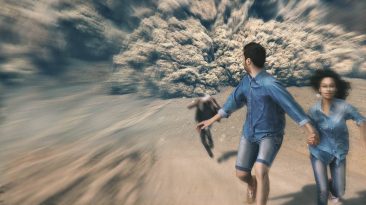We’ve walked you through some of the most terrifying scenarios on Earth. Natural disasters, terrorist attacks and countless other deadly dangers. You’ve realized that there are a few basic skills every survivor should know when they’re alone fighting the odds. Today we’re going to expand on them.
We’ll share with you the essential skills you should learn for when everything goes wrong. Ready?
Look at your surroundings. You’re only a small disaster or accident away from a life-threatening situation out in the wild. Some know-how and a few simple tools can make the difference between life and death.
How can a garbage bag save your life? How can you use your saliva to fish? And how can you find water when you’re stuck in the middle of nowhere?
Number 5: Start a fire
Making a fire is one of the most essential skills you need when you go into the wild. It will help you keep your food and water safe, stay warm and draw wild predators away. Create a fire pit by digging about 30 cm (1 ft) into the ground. Place the wood you have collected in the shape of a teepee. To light this, you will need to rub two thin, dry pieces of wood together until they produce an ember. Place this on some kindling and move it to your pit. Blow gently to increase the intensity of the fire.
Number 4: Build a shelter
If you can’t find your way home, you will need to build a shelter. Find a stable natural structure, such as trees or rocks. Place logs against it at a 45° angle, then cover the gaps between them. If you don’t have a tarp, use leaves or debris to fill in the gaps. And remember to place your shelter at least 3 m (10 ft) away from the fire.
Number 3: Watch what you eat
The safest way to find food is to stick to fruits, plants and insects. Insects may not be the most tempting thing, but they are a great source of protein. Avoid any that are brightly colored, furry or found on carcasses. Those may be poisonous. You’re better off sticking to grasshoppers, ants and earthworms. Don’t forget to cook them first. Yummy. Steer clear of mushrooms and berries. Sure, there are varieties that are safe, but just as many can make you sick.
Number 2: Go hunting
If you’re near a shallow body of water, you can try the “”spit fishing”” technique. It consists of, well, spitting on the surface of the water. Your spit will attract fish and you’ll have a chance to catch them with a net or your hands. You should always cook fish, as they may contain dangerous parasites.
If fish, insects or vegetation isn’t available, setting a bunch of traps would be another option. The easiest way to do this is to use wire or rope. Tie a knot that can slip and catch the prey. Wrap it around a sharp tree branch that you can nail firmly in the ground and place it near the foot of a tree. Trapping small game this way could save you a lot of vital energy.
Number 1: Get water
Hydrating is the most important thing you should do. If you’re near a lake or river, great. But if you’re not, you’ll find out that a container and a tarp or garbage bag can save your life.
A solar still will allow you to collect condensation. Dig a hole about 45 cm (1.5 ft) wide and 15 cm (6 in) deep. Place a container in the center and surround it with leaves or grass. Place the plastic sheet over the hole and seal the sides with rocks and soil. Place a small rock in the center of the plastic sheet to incline it over the container. The heat from the sunlight will cause the moisture in the soil to condense and you will be able to collect about half a liter of water per day. Cheers.
Now you can survive alone in the wild. But what if you’re attacked by some of the world’s most aggressive animals? And guess what? The most dangerous of them isn’t even a carnivore.
Sources
- “20 Essential Survival Tips Everyone Needs To Know”. 2016. Huffpost.
- ” Top 10 Outdoor Survival Tips“. 2022. Nwtf.Org.
- “Survival Tips Everyone Should Know“. 2020. Armed Forces Museum.
- “Top 10 Tips For Campfire Safety“. 2022. Reserveamerica.Com.
- “Top 9 Ways To Purify Water, If You’re Stranded And Desperate – Outdoorrevival”. 2017. Outdoor Revival.
- “Fire From Ice”. 2022. Wildwoodsurvival.Com.
- “Birch Trees: Types, Leaves, Bark – Identification (With Pictures)“. 2021. Leafy Place.

















